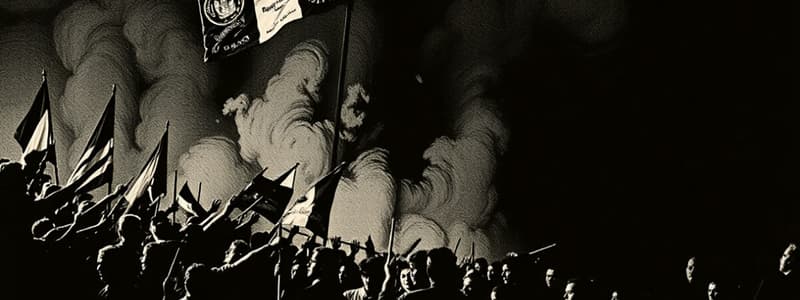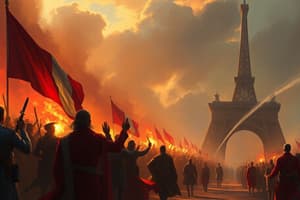Podcast
Questions and Answers
What significant political change began to emerge following the French Revolution as per the restructuring of subjecthood?
What significant political change began to emerge following the French Revolution as per the restructuring of subjecthood?
- Monarchy became more powerful than ever
- Church regained its authority over citizen decisions
- Nobility was allowed more social privileges
- Individuals were seen as subjects with free will (correct)
Which event in 1789 symbolized the growing power of citizens in governance?
Which event in 1789 symbolized the growing power of citizens in governance?
- The Tennis Court Oath (correct)
- The Fall of the Monarchy
- The Storming of the Bastille
- The Declaration of the Rights of Man
What were Enlightenment ideals contributing to during the late 18th century?
What were Enlightenment ideals contributing to during the late 18th century?
- Decline of commercial practices
- Strengthening of the monarchy
- Promotion of religious authority over secular beliefs
- Emergence of liberal democracy and human rights (correct)
What was a primary reason for the state’s bankruptcy leading up to the French Revolution?
What was a primary reason for the state’s bankruptcy leading up to the French Revolution?
Under the Old Regime, which social structure was prevalent in France?
Under the Old Regime, which social structure was prevalent in France?
What ideology gained prominence as a result of humanism after the restructuring of subjecthood?
What ideology gained prominence as a result of humanism after the restructuring of subjecthood?
What social class was primarily excluded from the rights granted in the new liberal democracy after the French Revolution?
What social class was primarily excluded from the rights granted in the new liberal democracy after the French Revolution?
What were citizens in France expected to do following the establishment of liberal democracy?
What were citizens in France expected to do following the establishment of liberal democracy?
What primary rights do individuals have in a liberal democracy and capitalism?
What primary rights do individuals have in a liberal democracy and capitalism?
What was the Bastille Jail a symbol of before its demolition?
What was the Bastille Jail a symbol of before its demolition?
What does the term 'Iconoclasm' refer to?
What does the term 'Iconoclasm' refer to?
What transformation occurred when statues of Louis XV were taken down?
What transformation occurred when statues of Louis XV were taken down?
In the context of graffiti, what does the term 'Tag' represent?
In the context of graffiti, what does the term 'Tag' represent?
What aspect of artistic creation is emphasized by the notion of an artist being a 'genius'?
What aspect of artistic creation is emphasized by the notion of an artist being a 'genius'?
What is the significance of artists circulating their work in the free market?
What is the significance of artists circulating their work in the free market?
What does the aesthetic and commercial value of a signature signify in contemporary culture?
What does the aesthetic and commercial value of a signature signify in contemporary culture?
What is one of the primary themes that David Hammons focuses on in his artwork?
What is one of the primary themes that David Hammons focuses on in his artwork?
What is the purpose of David Hammons' work according to the content?
What is the purpose of David Hammons' work according to the content?
According to Immanuel Kant, what is true aesthetic taste based on?
According to Immanuel Kant, what is true aesthetic taste based on?
What does Pierre Bourdieu suggest about taste?
What does Pierre Bourdieu suggest about taste?
How did the understanding of beauty change from antiquity to modernity?
How did the understanding of beauty change from antiquity to modernity?
What does Kant mean by saying there is 'no science of the beautiful'?
What does Kant mean by saying there is 'no science of the beautiful'?
What role does originality play in the context of art, according to the content?
What role does originality play in the context of art, according to the content?
What is the relationship between genius and the creation of art in modernity?
What is the relationship between genius and the creation of art in modernity?
Study Notes
The French Revolution & Art and the Modern Subject
- The French Revolution took place in 1789 and was a turning point in history.
- It was a time of significant change, with a transition away from a monarchical state to a liberal democratic state.
- With the rise of liberalism and capitalism, the individual's role and right to free will were emphasized.
Causes of the French Revolution
- Several years of poor grain harvests and rising food prices contributed to the unrest.
- The French state's bankruptcy, due to its participation in the American Revolution, put further strain on the country.
- The loss of colonial possessions and growing commercial dominance of Great Britain fueled dissatisfaction.
- The rise of Enlightenment ideals challenged the existing social hierarchy.
Restructuring of Subjecthood
- The French Revolution led to a major shift in the concept of "subjecthood," from a predetermined social hierarchy under the monarchy to a system where individuals were now citizens with inalienable rights and free will.
- The monarchy was abolished, and citizens were given the right to participate in the government and rule their country, leading to a sense of collectivism.
Humanism & the Modern Subject
- The concept of humanism gained increasing prominence during this period.
- Humanism emphasized the needs of man, rather than religious principles, marking a shift towards a secular worldview.
- Art became an important emblem of modern subjectivity, reflecting the individual's new freedom and agency.
Art, Liberal Democracy & Capitalism
- In a liberal democratic and capitalist society, individuals are granted the rights to property and contract.
- The individual artist is seen as the creator of art, expressing their free will and genius.
- The circulation of art in the free market determines its meaning and value.
The French Revolution as a Model for Modern Protest
- The protests of July 1789, leading to the French Revolution, were strikingly modern in their approach.
- They were influenced by the American Revolution and other European revolutions, demonstrating an understanding of concepts such as freedom and equality.
- The protests were not simply spontaneous outbursts but politically motivated acts of resistance against oppressive regimes.
Symbol Transformation and Iconoclasm
- The French Revolution witnessed a transformation of symbols of power through their modification and destruction.
- The destruction of the royal statue and the Bastille jail, a symbol of royal despotism, demonstrates the power of symbolic acts in challenging authority.
- This practice of challenging power structures through symbolic alteration continues to be a potent form of protest even today.
- The period saw a widespread destruction of images, known as iconoclasm, as revolutionaries aimed to eliminate symbols of the old regime.
- This practice was not limited to public symbols but extended to religious imagery as well.
Material Transformation of Symbols
- The French Revolution involved a material transformation of symbols.
- The debris of the Louis XV statue was melted down to create cannons, repurposing the symbol of a monarchy into a tool of revolution.
- Church bells, often symbols of religious authority, were melted down to create coins bearing the symbol of the republic.
Signature & Authorship
- Signature became an important symbol of authorship, demonstrating identity and authenticity.
- It also held a significant aesthetic and commercial value, reflecting the capitalist system's focus on individual ownership and exchange.
- In graffiti, the "tag," or signature, became a form of street art, representing the creative expression of minority and youth groups in urban environments.
David Hammons and Higher Goals
- David Hammons, an African-American conceptual artist, created "Higher Goals" (1983) to address racial themes.
- The installation, using recycled materials, explored the limitations and opportunities available to African-American men.
- It questioned the idea that basketball was the only path to success for the Black community.
Aesthetics: The Theory of Art
- Aesthetics is the theoretical counterpart to art, a relatively new field of study.
- Alexander Baumgarten coined the term "aesthetics" in 1735.
- Immanuel Kant, in 1790, defined aesthetics as the philosophy of beauty, emphasizing the idea of a pure, disinterested pleasure derived from contemplating an object.
Kant on Beauty, Genius & Taste
- According to Kant, true aesthetic taste is a universal consensus, representing a "common sense" judgment.
- However, today, taste is considered to be culturally produced and reflects social and economic distinctions.
Comparing Beauty, Genius & Taste Across Time Periods
- In antiquity, beauty was associated with moral good.
- In the medieval and Renaissance periods, beauty was not autonomous but was linked to moral, personal, and other forms of beauty.
- In modernity, beauty is an autonomous quality, with a focus on aesthetic appreciation.
- The concept of genius emerged in both antiquity and modernity, with artists possessing unique talents and capabilities. However, in modernity, the modern genius artist is seen as free from constraints, exercising independent will.
Studying That Suits You
Use AI to generate personalized quizzes and flashcards to suit your learning preferences.
Related Documents
Description
This quiz explores the significant events of the French Revolution and its influence on art and the concept of subjecthood. It highlights the transition from a monarchy to a liberal democracy and the impact of Enlightenment ideas on society. Test your knowledge on the causes and consequences of this pivotal historical period.




